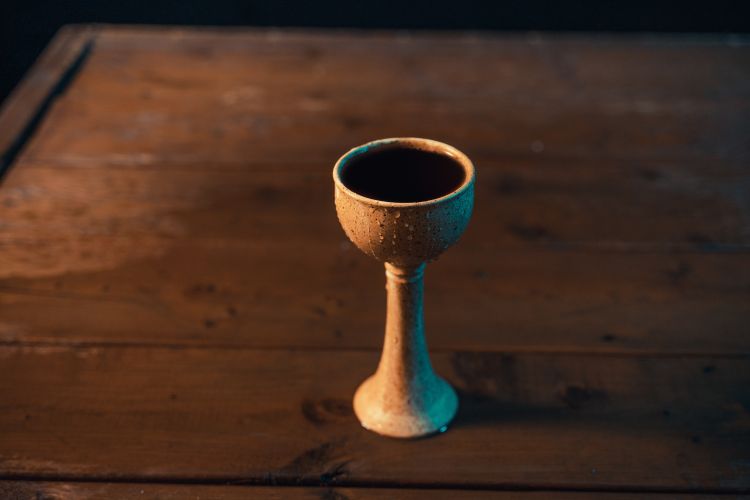The gospel of Jesus Christ brings to us an abundance of gifts. When we believe, we have new life; we have the forgiveness of our sins; we are new people, made part of the body of Christ, the church.
But the blessings of the gospel keep on coming, some of which we may not realize until months or years later.
In particular, the gospel gives us courage.
Courage to Approach God
Believing the gospel involves confessing our sin, and once we begin to glimpse our sin, we realize a portion of its horror. In the presence of our holy God, and without a mediator, this sin would electroshock our hearts, leaving us quivering on the ground. We would only fear God’s judgment, knowing we don’t belong anywhere near him.
But the gospel tells us that we now “have an advocate with the Father, Jesus Christ the righteous” (1 John 2:1). He is “the propitiation for our sins” (1 John 2:2), meaning that he absorbed God’s wrath that we deserved.
This changes everything!
We now have confidence to go to God. We can “with confidence draw near to the throne of grace” for “help in time of need” (Heb 4:16). Paul tells us that in Christ “we have boldness and access with confidence through our faith in him” (Eph 3:12) We have assurance that God hears us when we pray: “And this is the confidence that we have toward him, that if we ask anything according to his will he hears us” (1 John 5:14).
While we must not approach God with irreverence or presume upon him, we no longer come into his presence as one only flinching before a disciplinarian. We come to a holy God, but this holy God is our Father.
Courage to Admit Our Sin
If we understand that a fundamental part of us (our sin) is known fully by God, and if we grasp that he is devoted to us despite this knowledge, then our attitude toward our sin can change. We can stop trying to convince everyone we are perfect—or, in the church, we can stop trying to make others think we’re not too bad.
Such an acting job is exhausting. Keeping up appearances, admitting to respectable flaws but burying our less presentable wickedness, deflecting the questions of people who might actually want to be close friends—it’s enough to run us into the ground.
The good news is that it’s not necessary! We can admit our sin—to God, to ourselves, and to others. We can seek and expect help from the Holy Spirit to transform us, and in showing that we aren’t perfect we can invite others to live more honestly as well.
How does the gospel accomplish this? God’s love for us is secure, and we are reconciled to him through the work of Jesus. We no longer need to jealously guard our reputations or images. We don’t need to be obsessed with impressing others, because the most important One knows and loves us, and he won’t turn away.
Courage to Speak the Truth to Others
Good, harmonious relationships are rare and precious. Consequently, we often shy away from any conversation or topic that might endanger that harmony.
And yet, Christians are called to speak the truth in love. This might mean pointing a friend or acquaintance toward Jesus, inviting them to consider his claims. It could also mean offering correction to someone at church, calling them to repent of their sin.
How does the gospel give us courage to do these hard things?
In Christ, we are delivered from the rule of sin. We need not say only what others want to hear and ignore their offenses to God. In short, we need not live to please man any longer.
Most of us have an internal compass that directs us in conversation. We move toward or away from topics that make the other person uncomfortable or irritated. But as Christians grow, the Holy Spirit begins to override this compass, helping us to honor God instead of making relational peace our only aim.
The gospel had this transforming effect on the apostle Paul. He describes how God gave him “boldness” to declare “the gospel of God in the midst of much conflict” (1 Thess 2:2). Paul spoke the gospel “not to please man, but to please God, who tests our hearts” (1 Thess 2:3).
The confidence that we have “to enter the holy places by the blood of Jesus” (Heb 10:19) should lead us to “stir up one another to love and good works” (Heb 10:24). Often this stirring up happens through encouragement, but sometimes it happens through confrontation.
Gospel Boldness
When a person comes to Christ, they may not develop radical boldness right away. But the trajectory of our lives should point more and more toward the sort of courage that the gospel inspires.
We who know Jesus have been given the “ministry of the Spirit,” which has far more glory than the “ministry of condemnation” (2 Cor 3:8-9). This “ministry of righteousness” is glorious, in part, because it is permanent (2 Cor 3:9, 11).
The more we believe this, the more we’ll be able to say, with Paul, “since we have such a hope, we are very bold” (2 Cor 3:12).
Photo credit


